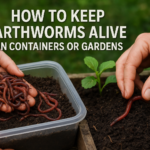Earthworms are nature’s best soil engineers. Whether you’re composting, gardening, or breeding worms for fishing, keeping them alive and healthy is the key to success. Species like red wigglers (Eisenia fetida) and European nightcrawlers (Eisenia hortensis) are excellent for composting and soil improvement, while Canadian nightcrawlers are ideal for fishing bait.
If you’re setting up a worm bin, worm farm, or garden bed, understanding how to create the right conditions can help your worms thrive. At Meme’s Worms, we provide live worms for composting, gardening, and fishing — and here’s how to care for them properly.
1. Choose the Right Worm Species
Different worms thrive under different conditions.
- Red Wigglers (Eisenia fetida): Best worms for composting and vermiculture.
- European Nightcrawlers (Eisenia hortensis): Ideal for both composting and fishing.
- Earthworms: Great for improving soil aeration and structure in gardens.
Before buying, consider your purpose — composting, fishing, or soil enhancement — and choose accordingly.
2. Provide the Right Container
Use a container with drainage holes to prevent excess moisture. A plastic or wooden worm bin with a lid works best. If keeping worms outdoors, make sure the container is shaded and protected from direct sunlight or heavy rain.
Avoid sealed containers, as worms need airflow. Proper ventilation helps them breathe and keeps odors away.
3. Maintain Proper Moisture
Worms breathe through their skin, so moisture is essential. The soil or bedding should be as damp as a wrung-out sponge — moist, but not waterlogged.
If the bedding feels dry, lightly mist it with water. Too much moisture can drown worms, while dryness can cause dehydration.
4. Use Nutrient-Rich Bedding
Bedding provides comfort and nutrients for worms. Use materials like:
- Coconut coir or peat moss
- Shredded newspaper or cardboard
- Compost or garden soil
Mix in a handful of compost or worm castings from your bin to introduce beneficial microbes. At Meme’s Worms, we recommend adding small amounts of organic matter like leaves or food scraps for extra nourishment.
5. Feed Them Properly
Worms love organic waste such as fruit peels, vegetable scraps, coffee grounds, and crushed eggshells. Avoid adding meat, dairy, or oily food — these attract pests and cause odor.
Feed your worms small amounts every few days and observe how quickly they consume the food. If food remains after a week, reduce the feeding frequency.
6. Maintain Temperature and pH Balance
Most composting worms thrive between 55°F to 77°F (13°C to 25°C). Extreme heat or cold can harm them. Keep bins in a shaded area during summer and insulated during winter.
Maintain a neutral pH (around 7) by adding crushed eggshells or agricultural lime occasionally. This prevents the environment from becoming too acidic.
7. Regularly Harvest Worm Castings
Worm castings are nutrient-rich compost that boosts soil health and plant growth. Every few months, harvest the finished compost and replace it with fresh bedding.
Use the harvested worm castings in your garden soil, potted plants, or vegetable beds to enrich the soil naturally.
8. Keep the Habitat Clean
Remove uneaten food and excess moisture to prevent foul smells and fruit flies. Turn the bedding gently every couple of weeks to ensure airflow and prevent compaction.
A clean worm habitat helps maintain a balanced ecosystem where worms can reproduce and thrive.
9. Using Worms in Your Garden
If you’re keeping worms directly in your garden soil, make sure it contains plenty of organic matter like compost and leaves. Avoid chemical fertilizers or pesticides that can kill earthworms.
You can also release red wigglers or nightcrawlers in garden beds to improve soil texture and aeration naturally.
Conclusion
Keeping earthworms alive in containers or gardens is simple when you provide the right environment — moisture, food, and organic bedding. Whether you’re interested in vermicomposting, worm farming, or using worms for fishing, proper care ensures a thriving worm population.
At Meme’s Worms, we supply a wide range of live compost worms, red wigglers for sale, European nightcrawlers, and fishing worms — perfect for both home gardeners and commercial worm farms.
For more details or to order live worms online, contact us at:
Phone: 229-507-0203
Email: hello@memesworms.com

